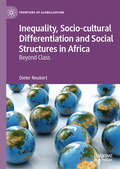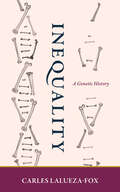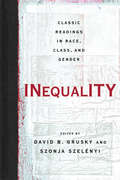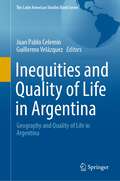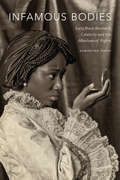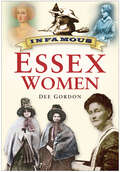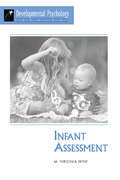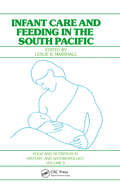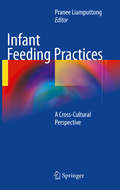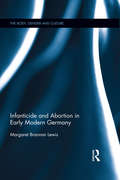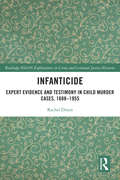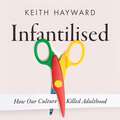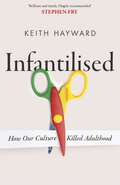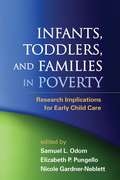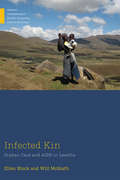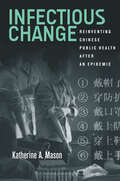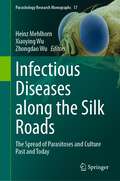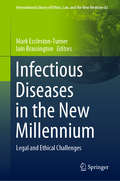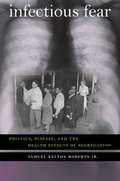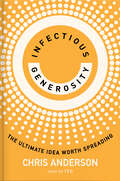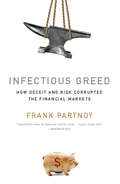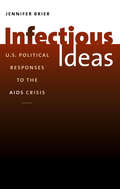- Table View
- List View
Inequality, Socio-cultural Differentiation and Social Structures in Africa: Beyond Class (Frontiers of Globalization)
by Dieter NeubertThis book contends that conventional class concepts are not able to adequately capture social inequality and socio-cultural differentiation in Africa. Earlier empirical findings concerning ethnicity, neo-traditional authorities, patron-client relations, lifestyles, gender, social networks, informal social security, and even the older debate on class in Africa, have provided evidence that class concepts do not apply; yet these findings have mostly been ignored.For an analysis of the social structures and persisting extreme inequality in African societies – and in other societies of the world – we need to go beyond class, consider the empirical realities and provincialise our conventional theories. This book develops a new framework for the analysis of social structure based on empirical findings and more nuanced approaches, including livelihood analysis and intersectionality, and will be useful for students and scholars in African studies and development studies, sociology, social anthropology, political science and geography.
Inequality: A Genetic History
by Carles Lalueza-FoxHow genomics reveals deep histories of inequality, going back many thousands of years. Inequality is an urgent global concern, with pundits, politicians, academics, and best-selling books all taking up its causes and consequences. In Inequality, Carles Lalueza-Fox offers an entirely new perspective on the subject, examining the genetic marks left by inequality on humans throughout history. Lalueza-Fox describes genetic studies, made possible by novel DNA sequencing technologies, that reveal layers of inequality in past societies, manifested in patterns of migration, social structures, and funerary practices. Through their DNA, ancient skeletons have much to tell us, yielding anonymous stories of inequality, bias, and suffering. Lalueza-Fox, a leader in paleogenomics, offers the deep history of inequality. He explores the ancestral shifts associated with migration and describes the gender bias unearthed in these migrations—the brutal sexual asymmetries, for example, between male European explorers and the women of Latin America that are revealed by DNA analysis. He considers social structures, and the evidence that high social standing was inherited—the ancient world was not a meritocracy. He untangles social and genetic factors to consider whether wealth is an advantage in reproduction, showing why we are more likely to be descended from a king than a peasant. And he explores the effects of ancient inequality on the human gene pool. Marshaling a range of evidence, Lalueza-Fox shows that understanding past inequalities is key to understanding present ones.
Inequality: Classic Readings in Race, Class, and Gender (Studies In Social Inequality Ser. #71)
by David GruskyThis book redirects the focus of public debate to issues of gender and racial segregation and suggests that they should be fundamental to thinking about the status of black Americans and the origins of the urban underclass. It is a starting point for students and advanced scholars of inequality.
Inequities and Quality of Life in Argentina: Geography and Quality of Life in Argentina (The Latin American Studies Book Series)
by Juan Pablo Celemin Guillermo VelázquezThe basis of this proposal is the study of quality of life from an interdisciplinary perspective. This volume presents a set of contributions from different sciences that analyse the quality of life in Argentina. The contributions come from the social disciplines (Geography, Economics, Demography, History) and from the field of health (Nutrition, Medicine, Psychology) as well as the applied sciences (Statistics, Applied Mathematics). The purpose is to present various dimensions related to the well-being of the population, particularly in relation to poverty, human development, health, nutrition and morbidity. Although there are works from different sciences associated with the object of study, they all have a geographic component based on cartography. Consequently, the importance of geography is highlighted, as the territorial base allows for the study quality of life from a unique perspective where the map emerges as a fundamental descriptive tool. Such an approach is useful to diagnose the quality of life and its uneven spatial distribution, either through index or different associated variables. Thus, the maps are fundamental to study the territorial configuration of the quality of life at the different scales of analysis, showing spatial inequalities and the areas where it is necessary to take measures to improve the population's living conditions.
Infamous Bodies: Early Black Women’s Celebrity and the Afterlives of Rights
by Samantha PintoThe countless retellings and reimaginings of the private and public lives of Phillis Wheatley, Sally Hemings, Sarah Baartman, Mary Seacole, and Sarah Forbes Bonetta have transformed them into difficult cultural and black feminist icons. In Infamous Bodies, Samantha Pinto explores how histories of these black women and their ongoing fame generate new ways of imagining black feminist futures. Drawing on a variety of media, cultural, legal, and critical sources, Pinto shows how the narratives surrounding these eighteenth- and nineteenth-century celebrities shape key political concepts such as freedom, consent, contract, citizenship, and sovereignty. Whether analyzing Wheatley's fame in relation to conceptions of race and freedom, notions of consent in Hemings's relationship with Thomas Jefferson, or Baartman's ability to enter into legal contracts, Pinto reveals the centrality of race, gender, and sexuality in the formation of political rights. In so doing, she contends that feminist theories of black women's vulnerable embodiment can be the starting point for future progressive political projects.
Infamous Essex Women
by Dee GordonHere are Essex Girls in a different light to the stereotype of modern public expectation. Murderers, mayhem-makers, swindlers, witches, smugglers and lustful adulteresses have played a part in the darker side of the county's history. From the thirteenth century onwards, Essex has produced more than its fair share of infamous women. Some got their comeuppance, some profited from their infamy and others were misguided, or with the benefit of hindsight, misjudged. The reader will find a plethora of women to hate, ridicule or secretly admire in Dee Gordon's new book. Some of the characters featured here might horrify or mystify, others will provoke empathy or disbelief, but all tales are authenticated by hours of research. Read, learn, squirm - and smile!
Infant Assessment
by M. Virginia WylyInfancy is one of the most fascinating periods in the human life cycle. In two short years, infants become thinking, speaking, social beings. As this book explains, over the past three decades, researchers and clinicians have developed an array of assessment methods for measuring infant development and diagnosing infants with developmental delays.The field of infant assessment has broadened from a major focus on cognitive development to an emphasis on parent-infant interaction, play assessment, and newer strategies that involve naturalistic observations. Because of the need to look at the whole infant, assessment often involves multiple disciplines. The interdisciplinary approach measures the infant domains of motor skills, cognitive abilities, and language acquisition and evaluates the infant's psychosocial environment.The chapters in this volume provide a solid overview of the current trends in infant assessment measures and procedures. The book can be used in undergraduate and graduate infant development courses and for advanced courses in infant assessment.
Infant Care and Feeding in the South Pacific (Food and Nutrition in History and Anthropology)
by Leslie B. MarshallFirst Published in 1985. This is Volume 3 of a series on Food and Nutrition in History and Anthropology. In the aftermath of the controversial marketing of infant formula in the Third World, this volume describes infant care and feeding practices within their social, cultural and physical context among fourteen different Melanesian and Polynesian societies. The contributors address such issues as health and nutritional status, women's roles and social support, early socialization, symbolism and meaning of foods and feeding and intracultural variability. The material is valuable to health professionals, nutritionists and social scientists in understanding infant care and feeding practices in underdeveloped regions.
Infant Feeding Practices
by Pranee LiamputtongIt's natural... It's unsightly... It's normal... It's dangerous. To breastfeed or not? For millions of women around the world, this personal decision is influenced by numerous social, cultural, and health factors. Infant Feeding Practices is the first book to delve into these factors from a global perspective, revealing striking similarities and differences from country to country. Dispatches from Asia, Australia, Africa, the U.K., and the U.S. explore as wide a gamut of salient issues affecting feeding practices as traditional beliefs about colostrums, "breast is best" campaigns, partner attitudes, workplace culture, direct government intervention, and the pressure to be a "good mother." Throughout these informative pages, women are seen balancing innovation and tradition to nurture healthy, thriving babies. A sampling of topics covered: * Policy versus practice in infant feeding. * Infant feeding in the age of AIDS. * Managing the lactating body: the view from the U.S. * Motherhood, work, and feeding. * The effects of migration on infant feeding. * From breastfeeding tradition to optimal breastfeeding practice. Infant Feeding Practices is a first-of-its-kind resource for researchers and practioners in maternal and child health, public health, global health, and cultural anthropology seeking empirical findings and culturally diverse information on this sensitive issue.
Infant Mortality and Working-Class Child Care, 1850-1899
by Melanie ReynoldsInfant Mortality and Working-Class Child Care, 1850-1899 unlocks the hidden history of working-class child care during the second half of the nineteenth century, seeking to challenge those historians who have cast working-class women as feckless and maternally ignorant. By plotting the lives of northern women whilst they grappled with industrial waged work in the factory, in agriculture, in nail making, and in brick and salt works, this book reveals a different picture of northern childcare, one which points to innovative and enterprising child care models. Attention is also given to day-carers as they acted in loco parentis and the workhouse nurse who worked in conjunction with medical paediatrics to provide nineteenth-century welfare to pauper infants. Through the use of a new and wide range of source material, which includes medical and poor law history, Melanie Reynolds allows a fresh and new perspective of working-class child care to arise.
Infant and Toddler Care and Development
by Amanda TaintorWhen you think about infants and toddlers, what words and images come to mind? William James imagined infants as experiencing a “blooming, buzzing confusion” (James, 1890). More recent and more accurate images consider infants and toddlers as young scientists making sense of their world as they actively engage with it (Gopnik, 2012; Gopnik, Meltzoff & Kuhl, 1999). The goal of this section is to briefly introduce you to infants and toddlers by presenting demographic information, guiding principles of infant/toddler care and education and to demonstrate why quality care and education for infants and toddlers is so important.
Infanticide and Abortion in Early Modern Germany ("The Body, Gender and Culture" #19)
by Margaret Brannan LewisThis book is the first work to look at the full range of three centuries of the early modern period in regards to infanticide and abortion, a period in which both practices were regarded equally as criminal acts. Faced with dire consequences if they were found pregnant or if they bore illegitimate children, many unmarried women were left with little choice. Some of these unfortunate women turned to infanticide and abortion as the way out of their difficult situation. This book explores the legal, social, cultural, and religious causes of infanticide and abortion in the early modern period, as well as the societal reactions to them. It examines how perceptions of these actions taken by desperate women changed over three hundred years and as early modern society became obsessed with a supposed plague of murderous mothers, resulting in heated debates, elaborate public executions, and a media frenzy. Finally, this book explores how the prosecution of infanticide and abortion eventually helped lead to major social and legal reformations during the age of the Enlightenment.
Infanticide: Expert Evidence and Testimony in Child Murder Cases, 1688–1955 (Routledge SOLON Explorations in Crime and Criminal Justice Histories)
by Rachel DixonInfanticide examines medical expert evidence in infanticide cases, focusing specifically on the shifting notion of "certainty" in medical testimony. Beginning in the Early Modern period and concluding in the mid-twentieth century, it considers how courts determined whether an infant died from natural causes or other reasons, including violence. The book explores expert evidence in cases of infanticide and examines the extent of certainty created by medical specialists who founded their testimony on anatomical exploration and science. As the book progresses, it becomes clear that medical specialists were unable to scientifically establish cause of death and in doing so conveyed uncertainty in court proceedings. Rather than being regarded as a professional failing, Dixon argues that the uncertainty created by medical specialists redirected the outcomes of infanticide cases. The combination of uncertainty and the changing perceptions of infanticidal women by the court lead juries to find infanticidal women not guilty of a capital offence in many cases. This book will be of great interest to students and scholars of Criminology, Law and History.
Infantilised: How Our Culture Killed Adulthood
by Keith J. HaywardA SHREWD AND TIMELY EXPLORATION OF A CULTURAL LANDSCAPE PREDICATED ON THE PRIMACY OF YOUTHHave you ever noticed that in areas of everyday life, rather than being addressed like a mature adult, you're increasingly treated like an irresponsible child in constant need of instruction and protection?Noticing society's creeping descent into infantilisation is one thing, however understanding the roots and causes of the phenomenon is not quite so easy. But in this topical and vitally important new work, cultural theorist and academic, Dr Keith Hayward, exposes the deep social, psychological and political dangers of a world characterised by denuded adult autonomy.But importantly Infantilised is no one-dimensional, unsympathetic critique. Brimming with anecdotes and examples that span everything from the normalisation of infantilism on reality TV to the rise of a new class of political 'infantocrat', this comprehensive book also offers an insightful and at times humorous account of infantilism's seductive appeal, and details some suggestions for avoiding some of the pitfalls associated with our increasingly infantilised world.
Infantilised: How Our Culture Killed Adulthood
by Keith J. HaywardInfantilised: How Our Culture Killed Adulthood is the definitive grown-up's guide to a cultural landscape predicated on the primacy and constancy of youth.
Infantilised: How Our Culture Killed Adulthood
by Keith J. HaywardInfantilised: How Our Culture Killed Adulthood is the definitive grown-up's guide to a cultural landscape predicated on the primacy and constancy of youth.
Infants, Toddlers, and Families in Poverty: Research Implications for Early Child Care
by Samuel Odom Elizabeth P. PungelloIdentifying factors related to poverty that affect infants, toddlers, and their families, this book describes promising early child care and intervention practices specifically tailored to these children and families' needs. Leading authorities from multiple disciplines present cutting-edge research and discuss the implications for practice and policy. Contributors review salient findings on attention, memory, language, self-regulation, attachment, physical health, family processes, and culture. The book considers the strengths and limitations of existing early intervention services for diverse populations and explores workable ways to improve them.
Infected Kin: Orphan Care and AIDS in Lesotho (Medical Anthropology)
by Ellen Block Will McGrathAIDS has devastated communities across southern Africa. In Lesotho, where a quarter of adults are infected, the wide-ranging implications of the disease have been felt in every family, disrupting key aspects of social life. In Infected Kin, Ellen Block and Will McGrath argue that AIDS is fundamentally a kinship disease, examining the ways it transcends infected individuals and seeps into kin relations and networks of care. While much AIDS scholarship has turned away from the difficult daily realities of those affected by the disease, Infected Kin uses both ethnographic scholarship and creative nonfiction to bring to life the joys and struggles of the Basotho people at the heart of the AIDS pandemic. The result is a book accessible to wide readership, yet built upon scholarship and theoretical contributions that ensure Infected Kin will remain relevant to anyone interested in anthropology, kinship, global health, and care. Supplementary teaching materials are available at: https://www.csbsju.edu/sociology/anthropology-teaching-resources/useful-resources/infected-kin-teaching-resources
Infectious Change: Reinventing Chinese Public Health After an Epidemic
by Katherine MasonIn February 2003, a Chinese physician crossed the border between mainland China and Hong Kong, spreading Severe Acute Respiratory Syndrome (SARS)--a novel flu-like virus--to over a dozen international hotel guests. SARS went on to kill about 800 people and sicken 8,000 worldwide. By July 2003 the disease had disappeared, but it left an indelible change on public health in China. The Chinese public health system, once famous for its grassroots, low-technology approach, was transformed into a globally-oriented, research-based, scientific endeavor. In Infectious Change, Katherine A. Mason investigates local Chinese public health institutions in Southeastern China, examining how the outbreak of SARS re-imagined public health as a professionalized, biomedicalized, and technological machine--one that frequently failed to serve the Chinese people. Mason recounts the rapid transformation as young, highly trained biomedical scientists flooded into local public health institutions, replacing bureaucratic government inspectors who had dominated the field for decades. Infectious Change grapples with how public health in China was reinvented into a prestigious profession in which global impact and recognition were paramount--and service to vulnerable local communities was secondary.
Infectious Diseases along the Silk Roads: The Spread of Parasitoses and Culture Past and Today (Parasitology Research Monographs #17)
by Heinz Mehlhorn Zhongdao Wu Xiaoying WuThe heart of this volume is exploring the links between human disease spread and the broad Silk Road trading networks which connect Eurasian civilizations past and today. Compiled by an international team of subject authors, this book includes two themed parts. Readers are first introduced into history naming, former, present and future routes of the Silk Road, representing the longest trade way and culture diffuser in the world. The second part contains the main book focus and addresses medical research as well as individual diseases and parasite groups from the region in detail. By drawing an arc between the past and present disease situation, the authors trace how parasites and vectors spread around the globe, and what impact infectious diseases had and will have upon human civilizations.Through its interdisciplinary character this book will be enjoyed by interested readers from the fields of parasitology and palaeoparasitology, medical sciences and public health, as well as cultural history.
Infectious Diseases in the New Millennium: Legal and Ethical Challenges (International Library of Ethics, Law, and the New Medicine #82)
by Iain Brassington Mark Eccleston-TurnerThis book examines the often tough questions raised by infectious diseases through essays that explore a host of legal and ethical issues. The authors also offer potential solutions in order to ensure that past errors are not repeated in response to future outbreaks. The essays touch on a number of key themes, including institutional competence, the accountability and responsibility of non-state actors, the importance of pharmaceuticals, and the move towards a rights-based approach in global health.Readers gain insights into such important questions as follows: How can we help victims in other countries? What (if any) responsibility should be placed upon international organizations whose actions exacerbate infectious diseases? How can we ensure that pharmaceutical research helps all communities, even those who cannot afford to pay for the products? While broadly covering global health law, the book adopts an inter-disciplinary approach that draws on public international law, philosophy, international relations, human rights law, and healthcare economics. As such, it is a valuable resource for academic libraries, appealing to scholars and postgraduates engaged in relevant research, as well as to those engaged with global health and policy at the international level.
Infectious Fear
by Samuel Kelton RobertsFor most of the first half of the twentieth century, tuberculosis ranked among the top three causes of mortality among urban African Americans. Often afflicting an entire family or large segments of a neighborhood, the plague of TB was as mysterious as it was fatal. Samuel Kelton Roberts Jr. examines how individuals and institutions--black and white, public and private--responded to the challenges of tuberculosis in a segregated society. Reactionary white politicians and health officials promoted "racial hygiene" and sought to control TB through Jim Crow quarantines, Roberts explains. African Americans, in turn, protested the segregated, overcrowded housing that was the true root of the tuberculosis problem. Moderate white and black political leadership reconfigured definitions of health and citizenship, extending some rights while constraining others. Meanwhile, those who suffered with the disease--as its victims or as family and neighbors--made the daily adjustments required by the devastating effects of the "white plague."Exploring the politics of race, reform, and public health, Infectious Fear uses the tuberculosis crisis to illuminate the limits of racialized medicine and the roots of modern health disparities. Ultimately, it reveals a disturbing picture of the United States' health history while offering a vision of a more democratic future.
Infectious Generosity: The Ultimate Idea Worth Spreading
by Chris AndersonThe bestselling author, media pioneer, and curator of TED explores one of humankind&’s defining but overlooked impulses, and how we can super-charge its potential to build a hopeful future—&“an essential read to kick off the new year&” (Forbes, &“16 Must Have Books and Podcasts for Leaders in 2024&”)&“I flew through these pages with an increasing sense of joy. I hope that millions read this book.&”—Elizabeth Gilbert, author of Eat, Pray, LoveLet&’s face it: Recent years have been tough on optimists. Hopes that the Internet might bring people together have been crushed by the ills of social media. Is there a way back?As head of TED, Chris Anderson has had a ringside view of the world&’s boldest thinkers sharing their most uplifting ideas. Inspired by them, he believes that it&’s within our grasp to turn outrage back into optimism. It all comes down to reimagining one of the most fundamental human virtues: generosity. What if generosity could become infectious generosity? Consider • how a London barber began offering haircuts to people experiencing homelessness—and catalyzed a movement• how two anonymous donors gave $10,000 each to two hundred strangers and discovered that most recipients wanted to &“pay it forward&” with their own generous acts• how TED itself transformed from a niche annual summit into a global beacon of ideas by giving away talks online, allowing millions access to free learningIn telling these inspiring stories, Anderson has given us &“the first page-turner ever written about human generosity&” (Elizabeth Dunn). More important, he offers a playbook for how to embark on our own generous acts—whether gifts of money, time, talent, connection, or kindness—and to prime them, thanks to the Internet, to have self-replicating, even world-changing, impact.
Infectious Greed: How Deceit and Risk Corrupted the Financial Markets
by Frank PartnoyAs the global financial crisis unfolds people everywhere are seeking to understand how markets devolved to this perilous, volatile state. In this dazzling and meticulously researched work of financial history, first published in 2003, and now thoroughly revised and updated, law professor and financial expert Frank Partnoy tells the story of how "classical" Wall Street securities like stocks and bonds were quietly eclipsed by ever more "quantum" products like derivatives. He documents how, starting in the mid-1980s, each new level of financial risk and complexity obscured the sickness of corporate America, and how Wall Street's evlving paradigm moved farther and farther beyond the understanding-and regulation-of ordinary investors and government overseers, leading inevitably to disaster.
Infectious Ideas: U.S. Political Responses to the AIDS Crisis
by Jennifer BrierIn Infectious Ideas, Jennifer Brier convincingly argues that the AIDS epidemic had a profound effect on the American political landscape. Viewing contemporary history from the perspective of the AIDS crisis, she provides rich, new understandings of the complex social and political trends of the post-1960s era. Brier describes how AIDS workers--in groups as disparate as the gay and lesbian press, AIDS service organizations, private philanthropies, and the State Department--influenced American politics, especially on issues such as gay and lesbian rights, reproductive health, racial justice, and health care policy, even in the face of the expansion of the New Right. Indeed, the book shows that efforts to deal with AIDS produced significant fissures in the conservative movement during this period, especially when the State Department and USAID adopted AIDS as a centerpiece of its diplomatic strategy, including the distribution of millions of condoms overseas. Infectious Ideasplaces recent social, cultural, and political events in a new light, making an important contribution to our understanding of the United States at the end of the twentieth century.
